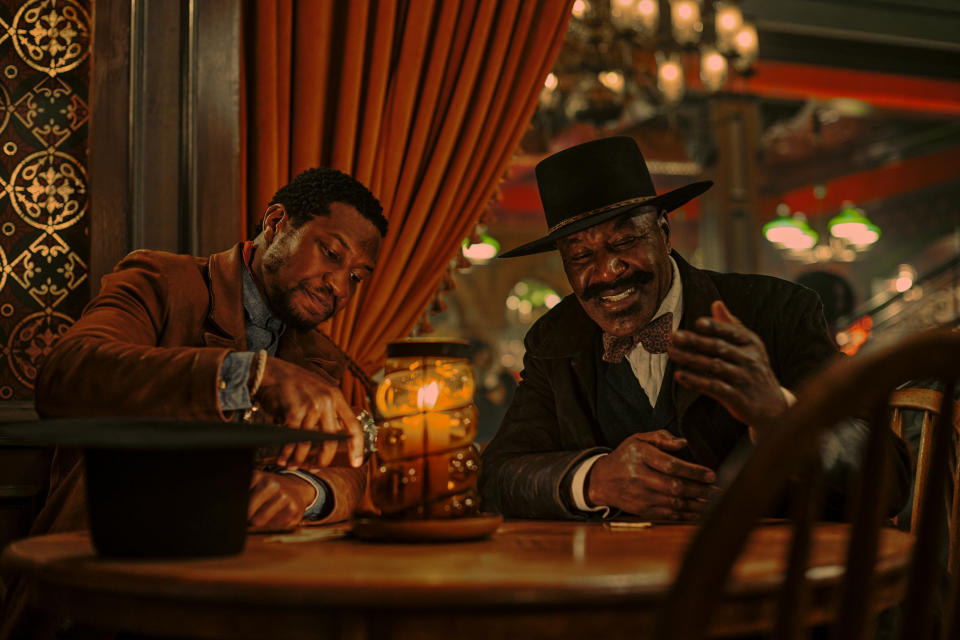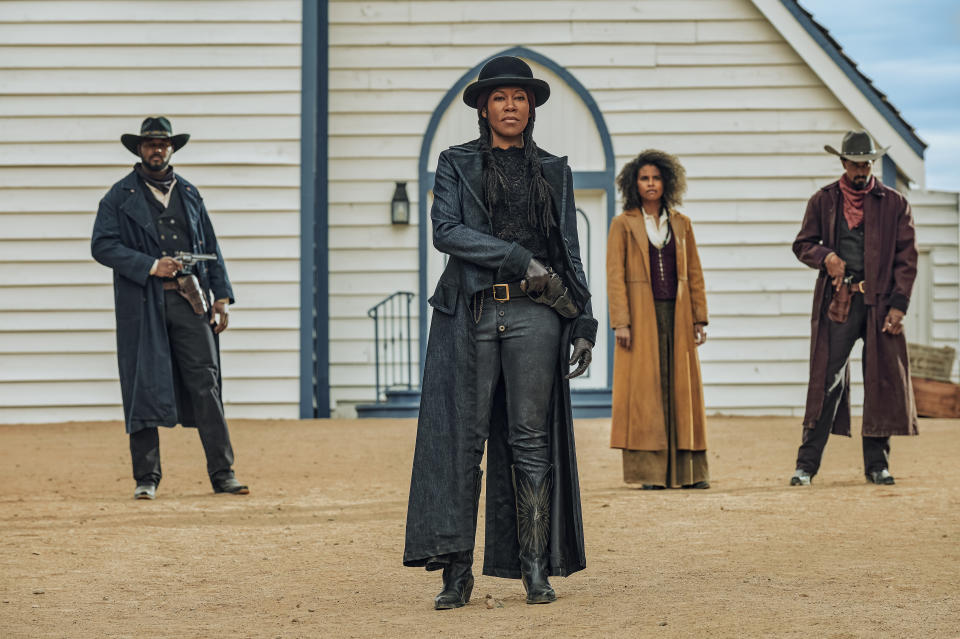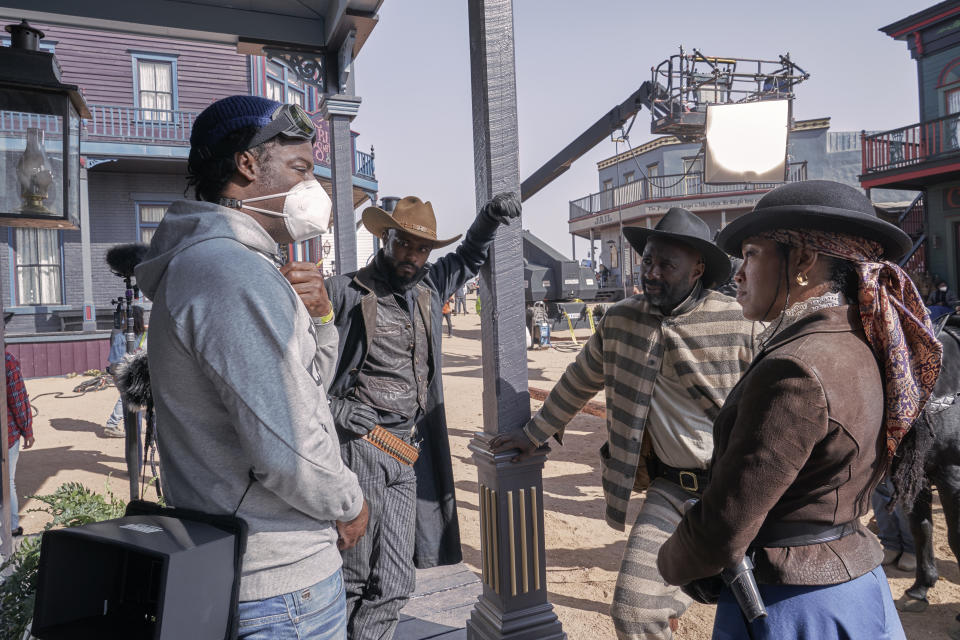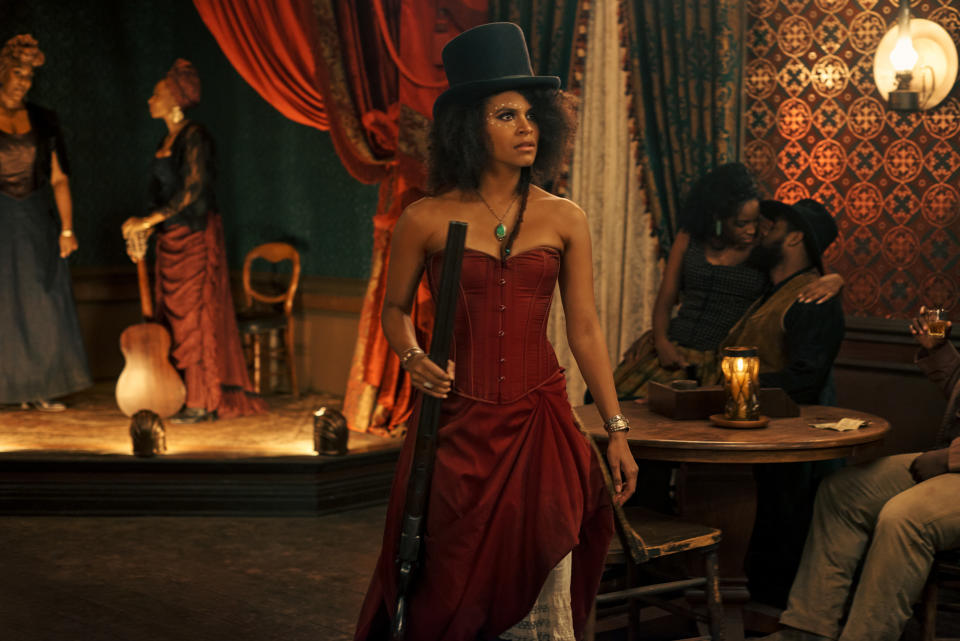After Jeymes Samuel Brought Diversity To The Western, He & LaKeith Stanfield Ready To Take On The Bible With ‘The Book Of Clarence’ — Cannes Disruptors
- Oops!Something went wrong.Please try again later.
- Oops!Something went wrong.Please try again later.

If you’re a fan of the music and video creations by singer-songwriter Jeymes Samuel — performed under his stage name The Bullitts — you’ll recognize that same enthusiasm, precociousness and ambition directed into his feature directorial debut, The Harder They Fall. Spurred by his love for the genre and the lack of diversity in old Hollywood westerns, Samuel recruited a veritable who’s who of Black actors — Idris Elba, LaKeith Stanfield and Jonathan Majors, among them — to play infamous gunslingers of color who somehow eluded the attention of previous storytellers. The film began its journey as the 2013 short They Die By Dawn, which he broadened into a Netflix feature seen around the world. A rare talent in that he not only writes, directs and produces but also scores his films — he has a silky singing voice reminiscent of his brother, Seal — Samuel’s versatility is outshone only by his irresistible and infectious enthusiasm for cinema, from its history to a future he is determined to be part of. Now, he’s ready to unveil his next film, this one with Stanfield and set in the Bible era.
Here, the multi-hyphenate filmmaker reflects on the experience, and how it actually teases his next project.
More from Deadline
Cannes Film Festival Gives Update On Early Ticketing Problems
Michel Gondry's New Film 'The Book Of Solutions' On Sale At Cannes Market
Critics Choice Real TV Awards: 'Top Chef' Whips Up Leading Five Nominations; Netflix Tops Networks

David Lee/Netflix
DEADLINE: You made your feature directorial debut on The Harder They Fall when you were 40, just like Ridley Scott.
JEYMES SAMUEL: No way. So that’s why he has gone so hard ever since.
DEADLINE: He is relentless. He told me a story where he saw the original Star Wars with the producer of a film he was going to make, then told the guy he could not make his film. Instead, he felt he had to do something in space, so he found Alien. How are you following your momentum on The Harder They Fall?
SAMUEL: I wasn’t going to make an announcement until the deal is done, but I’m going to tell you right here, right now for the first time I’m telling anyone. I’m going to tell Mike Fleming what the next movie is, right?
DEADLINE: Let’s have it.
SAMUEL: It took so long to make The Harder They Fall, 15 years since I first had the idea and 10 years of hard graft making it. To me, The Harder They Fall is like my Reservoir Dogs, my She’s Gotta Have It. Their next ones happened quickly. Mine is already written, and hopefully I’ll be shooting this year. I gave a huge Easter egg in The Harder They Fall to what my next movie is. Jim Beckwourth [RJ Cyler] is on his horse. Nat Love [Jonathan Majors] says, “You got a reason you want to die, too, Jim?” And he says, “Outside of you saving me from this?” And shows burn marks from the rope that was around his neck. He goes, “Besides, I hear Cherokee Bill [LaKeith Stanfield] runs with Rufus [Idris Elba]. Every time I speak on my speed, people pull Cherokee Bill out their ass. I’m going to put an end to that debate once and forever. Like you say in the Book of Clarence, ‘Can’t no man outspeed me.’” And Bill Picket [Edi Gathegi] says, “Outspeed ain’t a word and Clarence ain’t a book. I’m kinda hoping Cherokee Bill put a bullet in that ass just to shut him up.”
So, my next movie is The Book of Clarence. And LaKeith Stanfield will play Clarence. And I’m taking it all the way back to the Bible era. You remember those biblical epics, whether they were about the Bible or just taking place around it, from The Ten Commandments to The Greatest Story Ever Told, Samson and Delilah and Ben-Hur, which runs alongside all that stuff in the Bible? As will be The Book of Clarence, a full fun-filled extravaganza. It’s written and ready to go, and set in 29 AD.

David Lee/Netflix
DEADLINE: Your first film came from a longtime love of Westerns, even though as you said, you did not see many Black faces in them. What sparked you to do a Biblical tale, where the movies you mentioned also lacked Black faces, from what I recall?
SAMUEL: This is exactly what excites me. Firstly, the Bible’s the biggest franchise in the world. The biggest superhero, the most famous superhero of all time is Jesus himself. But when I used to learn about those things when I was a kid, I used to say to myself, “Where did Jesus buy his sandals from? Did he walk around barefoot? Did he buy his clothes or did people just say, “Hey Jesus, wear this?” Was there a particular brand that he liked, or a particular tailor who made his shawl? Where did Mary Magdalene get her hair done? They didn’t have any hair salons since the Cleopatra days. What currency did they spend? All that stuff the Bible doesn’t speak of fascinates me about the era. The Bible just gives you bricks. But the mortar you’re meant to fill in yourself. I want to show who he bought them from and what that guy was doing. What the guy that sold him those sandals had for breakfast, for dinner. Who was in the hood? Who was the troublemaker, or the cool dude that the girls liked? Who was the kid with aspirations? Who was the nincompoop? That stuff is what fascinates me about that era. The Book of Clarence is all of that stuff. It’s a really awesome, awesome, awesome tale.
DEADLINE: OK, it’s helpful to know where Mary Magdalene got her hair done, and about Jesus’ tailor. But some people have to die in this Biblical setting, right?
SAMUEL: You know me. If you’re at a performance that features Jimi Hendrix, you’re expecting him to burn the guitar. It’s me saying this, so I’m biased, but it’s a wicked movie, man. For me, The Book of Clarence, from the beginning of the movie to the end of the movie, is what I call the Richard Dreyfuss in a Steven Spielberg film face. You know Richard Dreyfuss. In Steven Spielberg’s movies, he’s always [looking bewildered]. Richard Dreyfuss is always looking up, with that look. Even if Jaws is coming level, when it’s on Richard Dreyfuss to kill him, he’ll be looking up. Hell, Close Encounters. So, what I’m looking for from you in The Book of Clarence, is Richard Dreyfuss’ face. Or the feeling you get when you first see the boulder chasing Indiana Jones. I promise, even the opening sequence, it’s such an original thing I’m doing with the opening sequence when the credits roll, and you’ll be eating your popcorn hopefully, and going, “I’ve never had this experience before.” It’s one of those. And you put Black people in there… I don’t want to give away too much. It’s going to be a really awesome, awesome movie. I’m happy that it’s you I told about it.
DEADLINE: Has there been a Biblical-era film where Black actors had roles of substance?
SAMUEL: I want to tell the tales that we’ve never had before. We’ve never had Black people in the Bible days of cinema. There’s not even a template for us to go, “Well, like that movie?” We’d seen a Black cowboy before. We’ve never seen… Even when Andrew Lloyd Webber made something as nuanced as Jesus Christ Superstar, there’s no Black people in it, except Judas. Judas was the Black guy. “I’m going to betray you, Jesus.” What the hell? That’s what you’re giving us? That’s the Black guy? You saw what I did with the Western. I want to give people something to talk about. Imagine when they unleash Jesus on me. I’m going to give us something we’ve never seen before. But it’s going to be so much fun. We’re deciding now where it will be made, talking to studios. I have a relationship with Netflix. That’s a big thing, but I do need this film to have a viable theatrical component as well.

David Lee/Netflix
DEADLINE: We’ve watched recently as Netflix saw its first significant drop in subscribers, its stock plummeted and they lost billions off their market cap. But last time we spoke, you made me think about things I hadn’t considered, like changing the staggered U.K. release of films, by opening movies around the world same day. Netflix is taking a turn in the barrel, but they have a stronger library than when the stock was riding high on the fickle Wall Street train.
SAMUEL: Yeah. To me, Netflix is like Uber. I didn’t use to call Uber, Uber. I used to call it karma. Because in the U.K., those famous black taxis do not stop for Black people.
DEADLINE: Really?
SAMUEL: They don’t stop for Black people. One time, me and Seal were leaving Harrods and we had all the shopping in the world. And we were standing there, and all the black taxis were going past us. And this is Seal! And he had to go back into Harrods and have a white person come out and hail a taxi for us. And we hid behind the bushes and jumped out and got in the taxi. So, Uber came out and righted all the wrongs. Now, black taxis stop for Black people because you need to make as much money as you can, and no one’s using you like they were, except tourists.
That’s Netflix, right? Netflix is Uber. Studios historically would not fund Black movies. They’ll give Black people the racist foreign distribution model, how much your movie is worth in Germany and how much your movie is worth here and there, giving you a worth for your movie, and that’s why they wouldn’t finance movies with Black people. I hate using the term Black movies. I think it’s an unfair term. Close Encounters of The Third Kind hasn’t got a single Black person in it, but it’s not a white movie. Movies are just movies. But the studios wouldn’t finance movies with Black people in them, saying they had no value overseas. The irony is, I live overseas. And then, Netflix comes around and they bypass that foreign sales market, that racist foreign sales distribution model, and they just fund movies. I don’t know if a studio would’ve funded The Harder They Fall. They may say they would’ve done it, but I’m not sure that they would have. I think when the pandemic hit, they would’ve bailed, whereas Netflix doubled down and spent even more so we were able to make the movie. That’s why I say Netflix is Uber. They are the out-and-out savior to filmmakers like myself who wanted to get their films done with a high budget and a cast of Black stars.
DEADLINE: You made a short film They Die by Dawn in 2013, a calling card for The Harder They Fall. The progression from a short to a feature is usually quicker.
SAMUEL: Yeah.
DEADLINE: You already had quite a name in music, in the playful video work you did under your Bullitts alter ego, and on soundtracks like The Great Gatsby. So, when you put out your short and said, “Hey, listen, here’s proof I got game, let’s do this,” what happened?
SAMUEL: Nothing.
DEADLINE: Nothing?
SAMUEL: Literally, no. I was taking it around. Vice, for South by Southwest, they made a 250-seat venue for us to premiere They Die By Dawn in. We had something like 12,000 RSVPs. That was the appetite for me to show Black people in that time and place. And then I released it on Tidal, and I was touring with it, doing all of these festivals. My friend was working at Warner Brothers at the time, and she said, “Warner’s would never make this movie. They’ll never make the movie version of this film.” And I was like, “Wow, really? At least take it in.” But she wouldn’t, and she was Black. I’m not sure that they wouldn’t have made it, but that’s what she told me. But this is what I was facing with everyone.
People not understanding the viability of what happens if you put Black people in major roles. Quentin put one Black guy in cowboy clothes and had the biggest movie of his career. This is just something that, when you give people something they’ve never seen before and they’re not used to seeing, there’s a huge appetite for it. So, take Black people in the Bible days. As my mother said, “The difference between The Harder They Fall, Jeymes, and The Book of Clarence is, I’ve been waiting for The Harder They Fall for my whole life. But The Book of Clarence? That’s the one I’ve really been waiting for my whole life.’ So, my mother’s been waiting her whole life and her mother’s been waiting for her whole life. Like everyone in the Bible. But I don’t know that studios… because I was talking to them for 10 years. I just don’t know that they would’ve made it. And Netflix are the ones that stepped up to back The Harder They Fall.

David Lee/Netflix
DEADLINE: It seems like there was more of a mandate to open up the director color palette with the #MeToo movement and other factors. I remember writing hopefully when the Hughes Brothers did Menace II Society and John Singleton did Boyz N The Hood and there was Spike Lee and a few others, and it felt like things were changing. It was just a fad because there were no leaders of color in Hollywood. A white person can try to look outside their own sensibilities, but I never realized that the one Black person in Jesus Christ Superstar…
SAMUEL: …was Judas.
DEADLINE: How much are things getting better for Black filmmakers to bring their sensibilities to stories they tell onscreen?
SAMUEL: The reaction to me has always been kind of… I kind of just pretty much exist by myself. I self-funded They Die By Dawn. I was going to shoot The Harder They Fall and would have shot it on iPhones if I couldn’t get it made. I never critique, I create. I never complain, I contribute. So, I was definitely making that movie. But the reaction has been awesome. We’ve won… I don’t know if you’d call it a snub, but we didn’t get any recognition from the Academy. But we won other rewards and I’ve had tremendous reaction from people, like, everyone knows who I am there, and they’ve offered me amazing projects and stuff. Although, I pretty much write my own stuff, and I can’t imagine someone offering me something more exciting than The Book of Clarence.
So, I would say things are changing. I’m not sure how much, because the change doesn’t come and is not going to come from Hollywood. It has to come from us.
DEADLINE: What do you mean?
SAMUEL: The change has to come from us as a people, right? Meaning we have to stop expecting to be given anything. I made They Die by Dawn. I didn’t go to whole Hollywood for funding. Remember that wave of indie filmmakers that came about in the early ’90s, Quentin, Robert Rodriguez, Steven Soderbergh, Edward Burns with The Brothers McMullen? I believe if they came around today, that wave, they would be shooting movies on iPhones. Meaning we have a powerful device, that we’re talking on them now. So, I do think now there is a way. If you look at Regina King, Shaka King, Donald Glover, Issa Rae, a whole wave of people. Issa made it by just doing shows on YouTube. I think it’s changing now, because we have more opportunities to have our voices heard both musically and in film, bypassing corporate entities and going straight to YouTube, using our iPhones. So, you might be seeing a whole new influx of talent that have come to prominence through Instagram. That is what has changed. We have to not expect anyone else to be the change that we want. Otherwise, it’s hashtag changes.
DEADLINE: What does that mean?
SAMUEL: Young women are kidnapped in Africa, and the hashtag is, bring back our girls. And then the Kardashians drop the premiere of Season 2. And then where are all those 200 women that were kidnapped? Hashtag changes don’t last. I believe we, as Black people should not wait for anything. I look at someone like Lena Waithe, who is a powerhouse of creativity, and you just look in her eyes and you can see a whole legacy. She’s a powerhouse and nothing is getting in her way, and nothing is stopping her. And I think the same with Issa Rae. Kent Powers is another one, Regina King. I don’t know if a change is here, per se, but I do know that I’m here now. So, the game is just going to be that much different.
I’ll give you a Western and then we’re going to the Bible days. And then we’re going to go somewhere else, and I’ll go back to the Old West. And then nothing is going to stop me telling the stories that I want to tell. I have boundless energy and boundless creativity. I do think the industry has changed because of streamers. We can’t ignore that stuff. The streamers have made more even the playing field. We have talented execs out there now, and so I think we’re going to see a lot more diverse stories. But we, as Black people, can’t wait for talented execs, or studios to have a guilty conscience. We have to find a way to make what we’re going to make, and nothing can stop us. I think that as soon as we all think like that, we’re not going to be beholden to any temporary waves of guilt. We can just be the change we want to see.
Sign up for Deadline's Newsletter. For the latest news, follow us on Facebook, Twitter, and Instagram.

